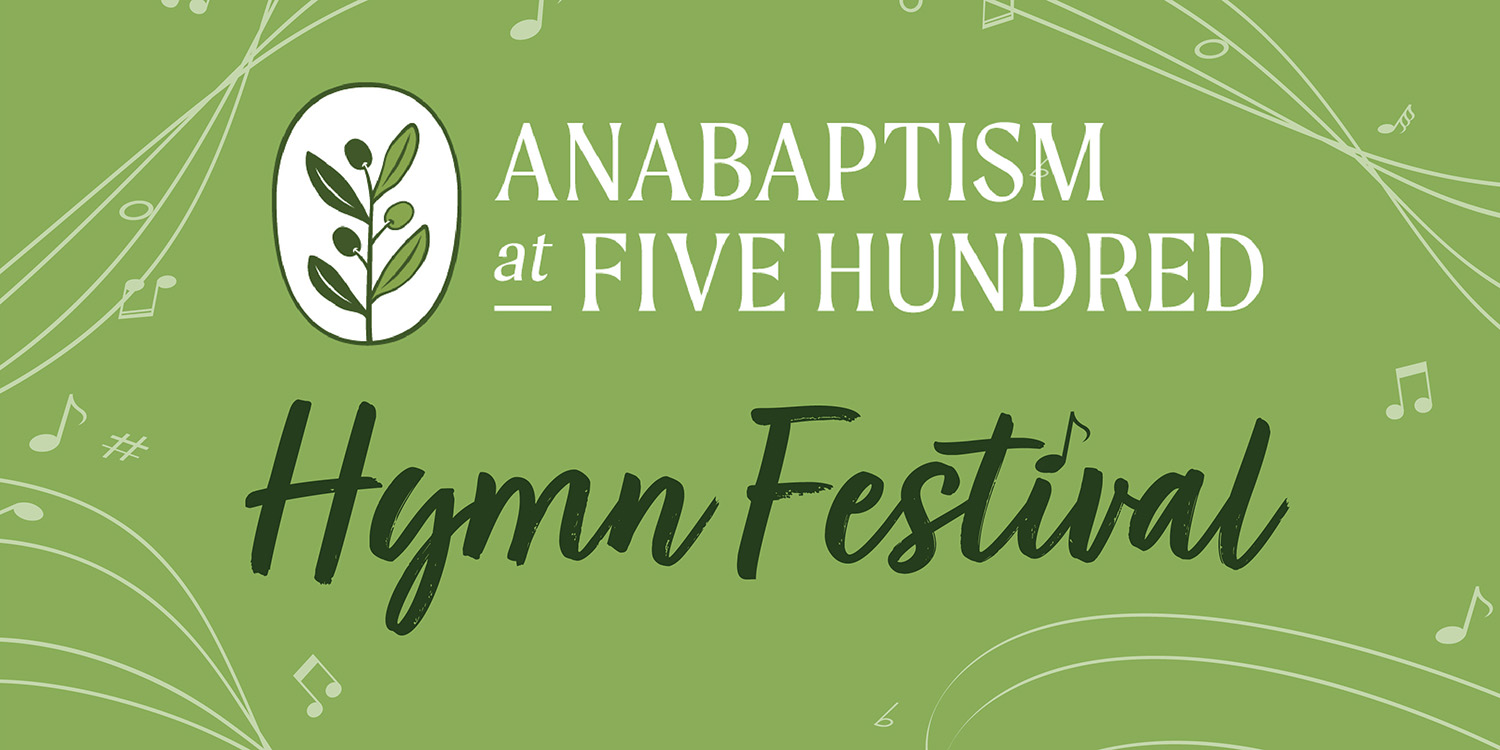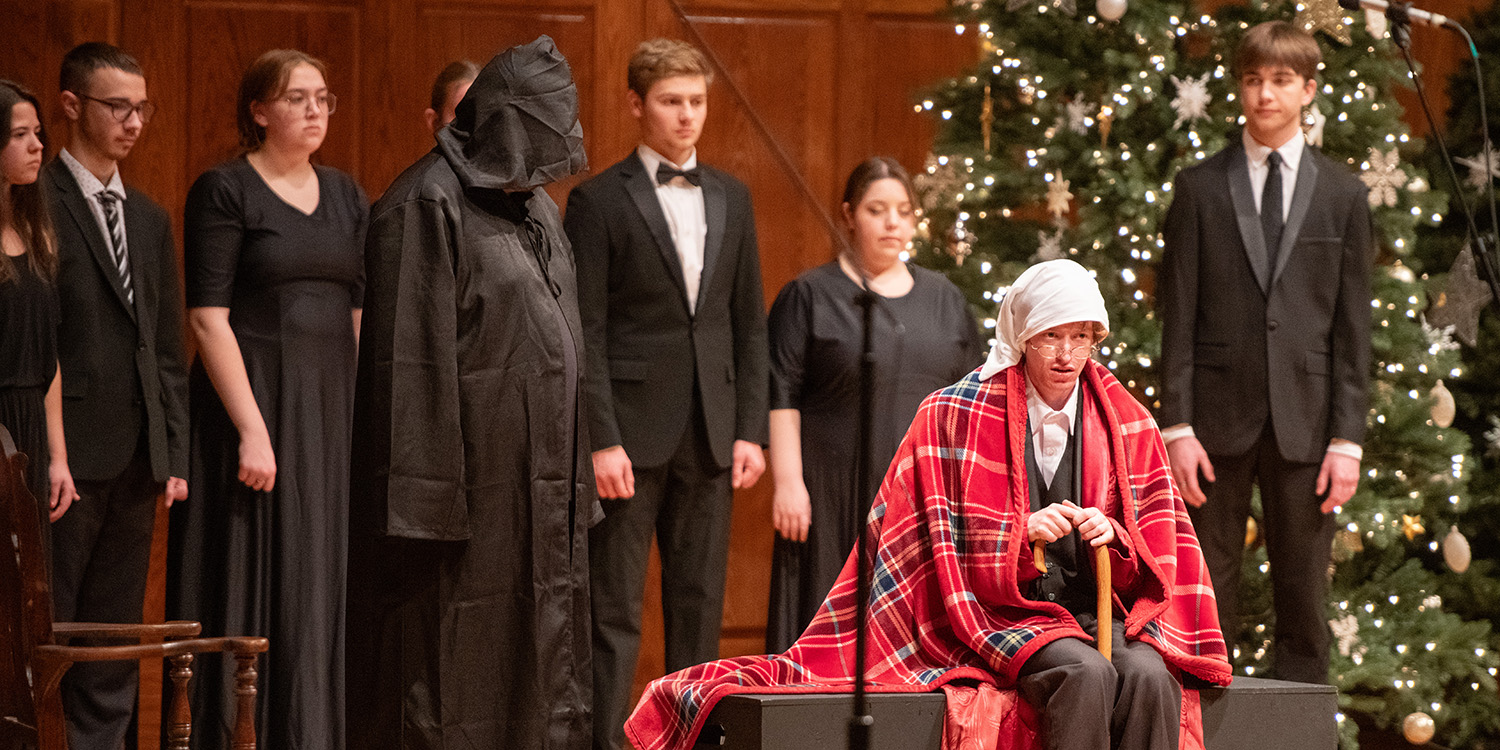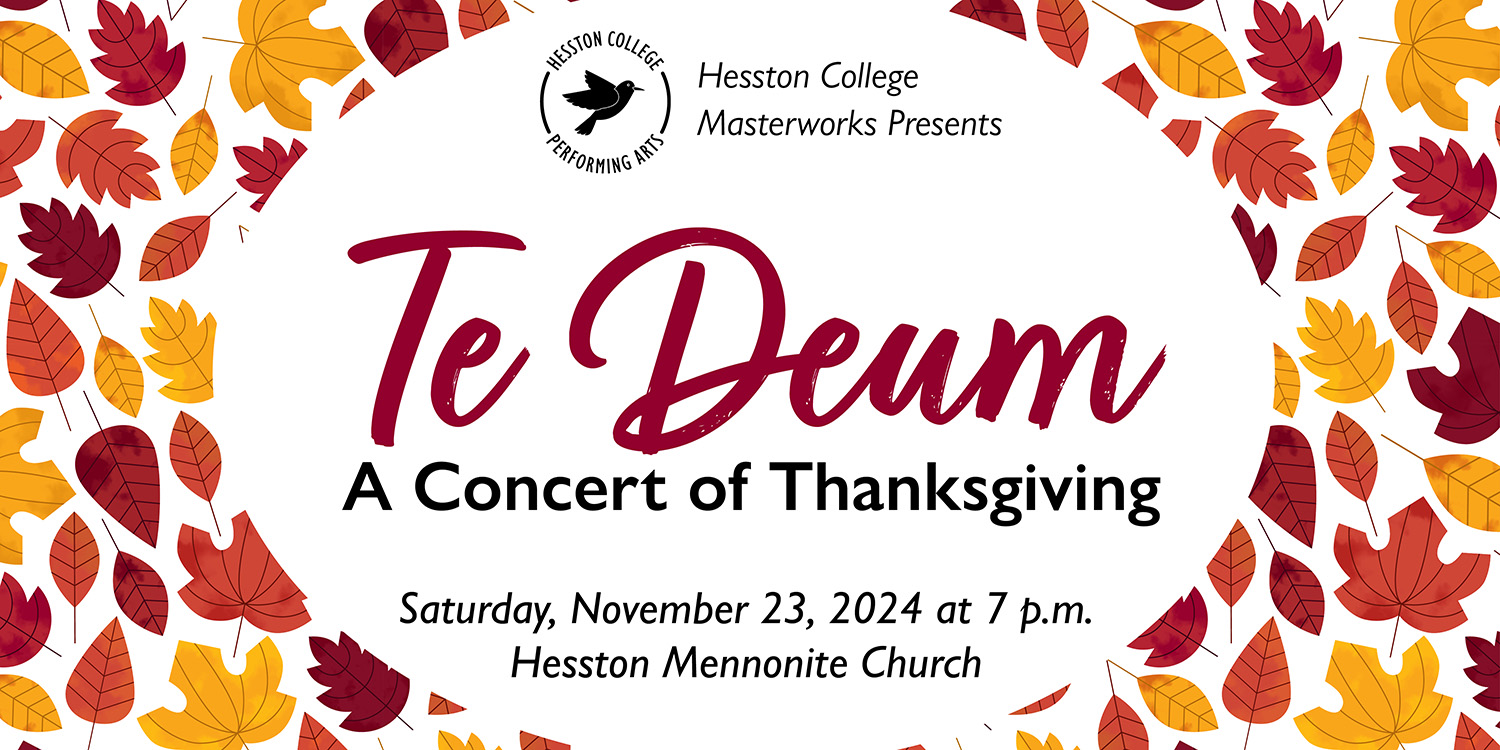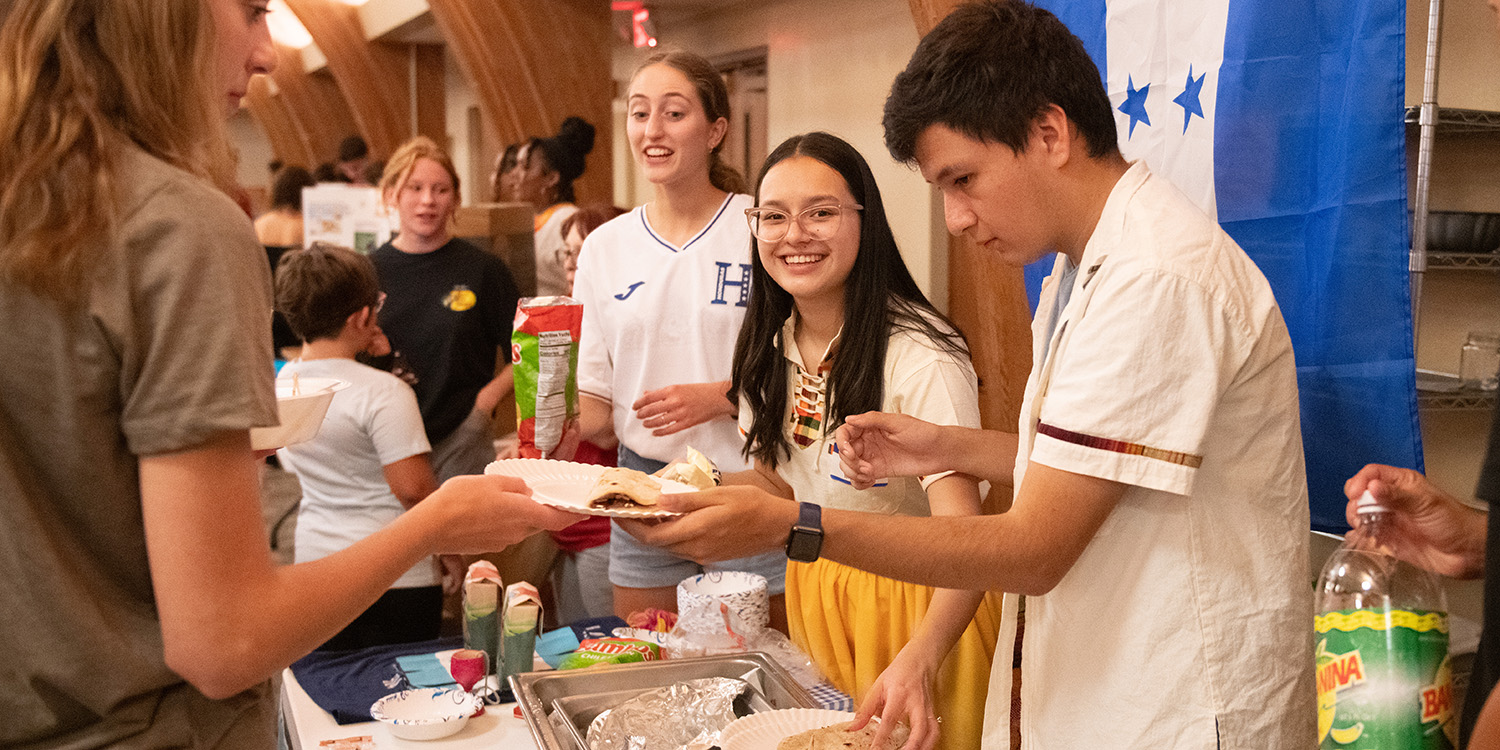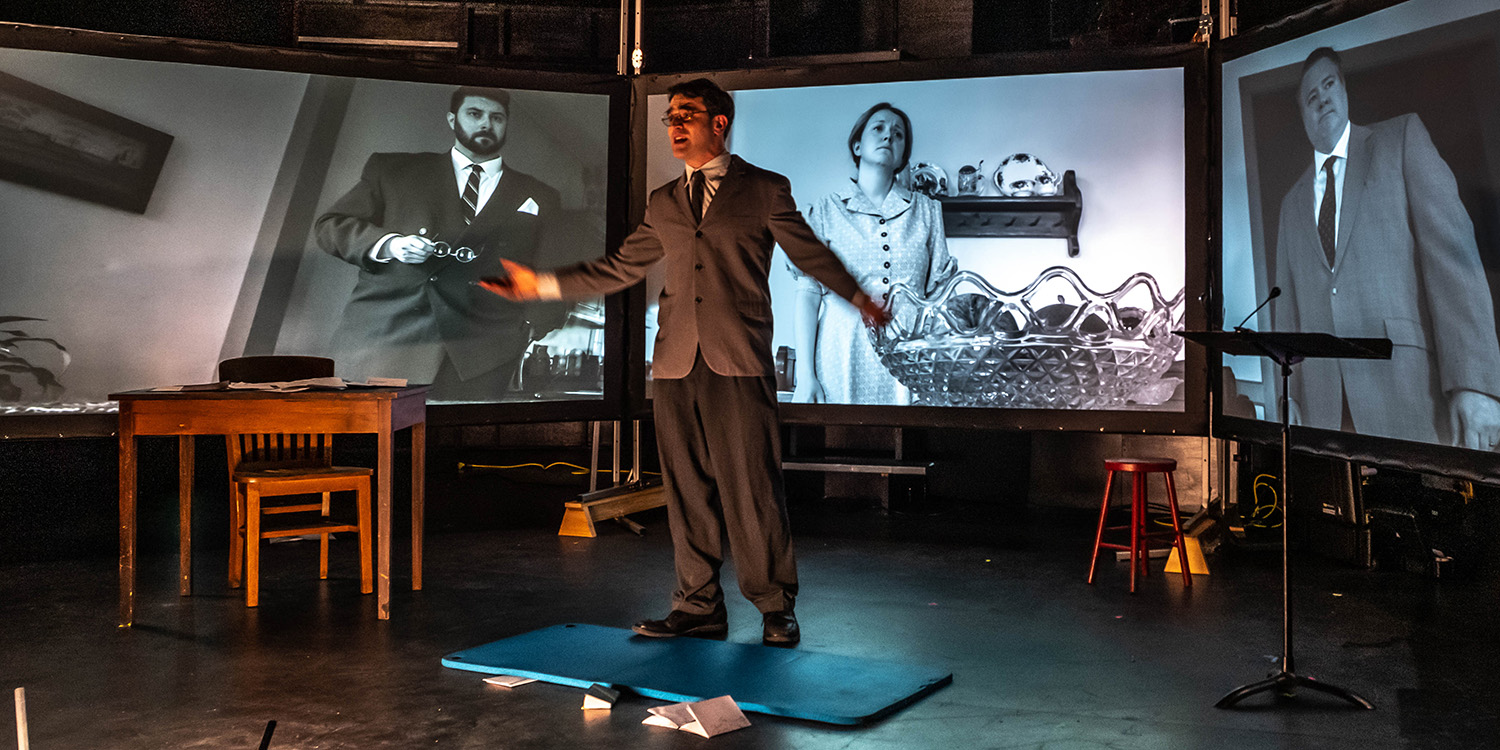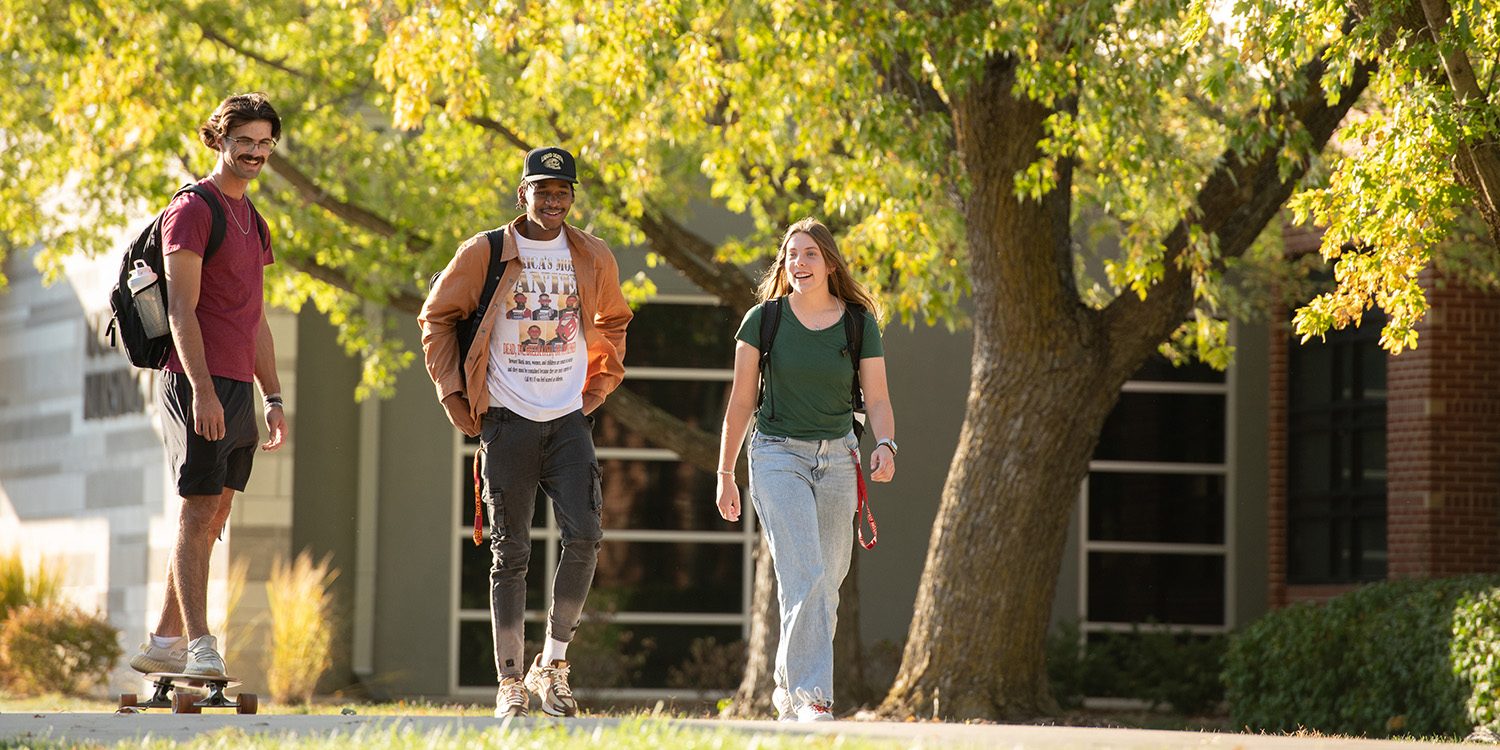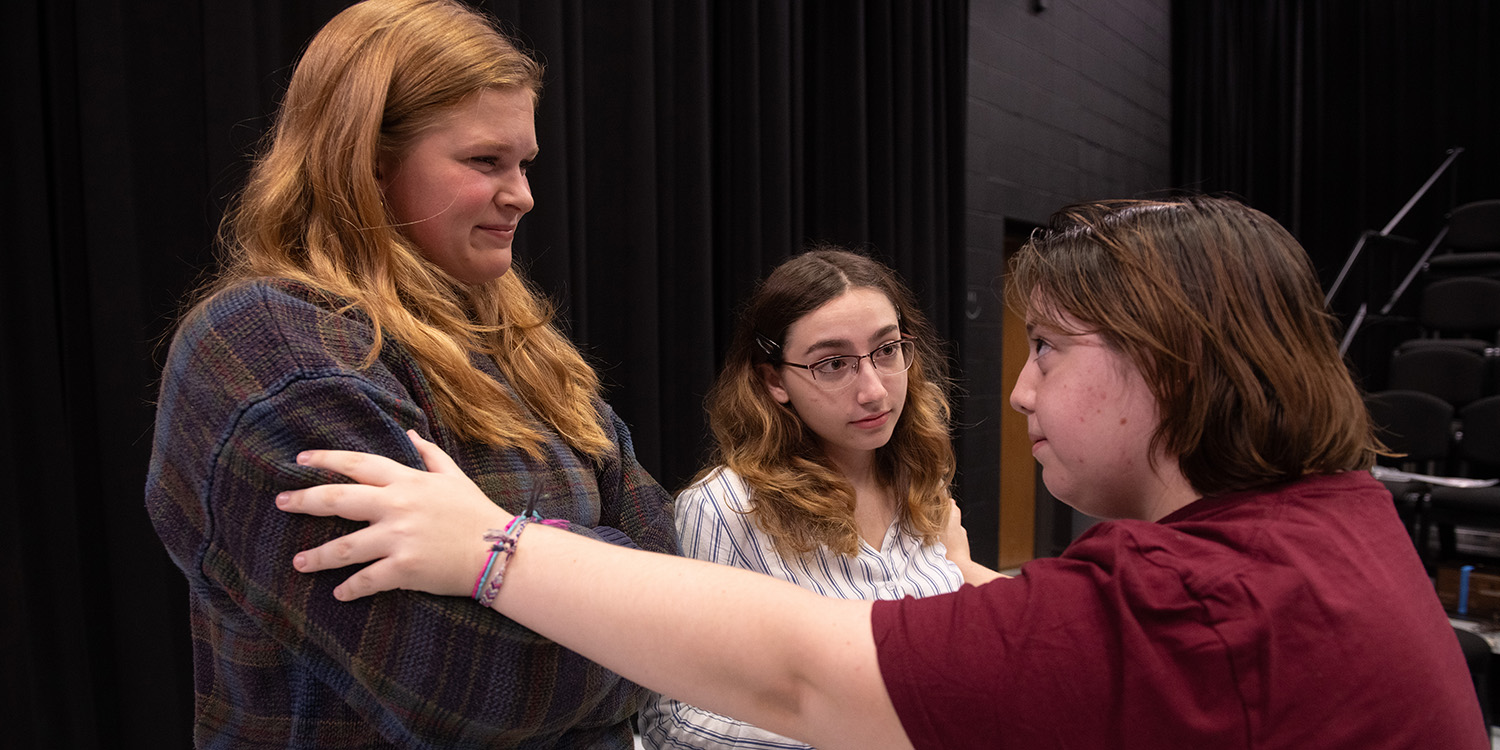
Hymn festival to celebrate Anabaptism at Five Hundred
The Hesston College Music Department invites the public to join in a historic celebration of faith, music and heritage at Anabaptism at Five Hundred: Hymn Festival on Sunday, January 19, at 3 p.m. at Hesston Mennonite Church.
The Hymn Festival will feature a historical narrative by Ken Rodgers, music professor, tracing the evolution of hymns and texts central to Anabaptist worship over the past 500 years. Another highlight of the event is choral and congregational singing, with singers from surrounding churches combining with audience participation to create a communal expression of faith and song. Music will be led by Dr. Russell Adrian, director of choral activities, and accompanied by Karen Unruh, performing arts staff member.
This community-wide event is part of worldwide celebrations commemorating the 500th anniversary of Anabaptism, a faith movement that began with the first adult baptisms in Zurich, Switzerland, on January 21, 1525. Those baptisms sparked the spread of Anabaptism across Europe and eventually around the globe, shaping religious history and traditions for half a millennium. The Hymn Festival also coincides with the release of the Anabaptist Community Bible, a significant new publication that reflects the shared theology and values of Anabaptist communities.
Join the Hesston College community for an inspiring afternoon celebrating a significant milestone in history through music and storytelling. For more information, contact the Hesston College Music Department at finearts@hesston.edu or 620-327-8141.
College hosts virtual ATL Experience, connecting students with sports management industry leaders
Hesston College School of Management hosted a successful virtual “ATL Experience” on December 3, a powerful online event connecting current and prospective students with industry professionals in an engaging discussion on sports management and business.
The panel featured four distinguished professionals:
- Warren Parr, vice president of ticket sales, Atlanta Falcons
- Keith Roberts, senior manager, Atlanta United
- Austin Jones, manager of corporate sponsorships, Rome Emperors
- Tyler Makins, assistant producer, NBA TV/Turner Sports
Two Hesston College students, Santiago Gonzalez and Yoshimune Goto, organized the event as their final project for their Professional Development class. Inspired by their recent trip to Atlanta for the Mennonite Economic Development Associates (MEDA) conference, they coordinated the event to share insights from that experience and provide a platform for networking and mentorship.
The panel discussion offered students invaluable advice on navigating careers in sports management and beyond. Tyler Makins and Austin Jones, both former students of Dr. Preston James, director of the School of Management, candidly shared their experiences transitioning from college to the professional world, emphasizing perseverance, adaptability and resilience.
“The ATL Experience was a remarkable demonstration of the power of relationships and networking,” said Dr. James, who has also worked with both Warren Parr and Keith Roberts in the past. “The willingness of these industry professionals to give back and mentor our students speaks volumes about the connections our program fosters.”
For students, the impact was immediate. Many expressed interest in forming a sports management club and felt inspired by the panelists’ real-world examples and advice. For Gonzalez and Goto, the event was a chance to sharpen their leadership, event planning and communication skills while making a lasting impression on their peers. Their efforts brought in a mix of in-person and virtual participants, including current and prospective students, faculty, staff, coaches and community members.
“The ATL Experience highlighted not only the growing opportunities in our sports management program but also the value of integrating real-world experiences into our curriculum,” said Dr. James. “This event was a meaningful step forward in preparing our students for success in their careers.”
Hesston’s sports management program is currently pending Higher Learning Commission approval and is anticipated to be available in fall 2025. For more information about this and Hesston College’s business program, contact the admissions office at admissions@hesston.edu.
Experience the magic of “’Twas the Night After Christmas”
Last year’s collaboration between music and theatre brought “A Christmas Carol” to stage with music by Bel Canto Singers and Josh Fleming as Scrooge.
Hesston College Performing Arts invites the community to a unique music and theater experience, “’Twas the Night After Christmas,” on December 8, at 7 p.m. at Hesston Mennonite Church. Admission is free, and attendees of all ages are welcome to join in an evening of reflection, artistry and collaboration.
A special effort between Hesston College’s theatre and music departments creates an enchanting performance. The two disciplines met early in the creative process and later found their efforts intertwined to create moments that feel intentionally crafted for one another. Some of the songs provided the main inspiration for a piece, while others enhance a scene or offer a musical interlude. All of the music beautifully complements the unfolding vignettes, bringing depth to this showcase of heartfelt exploration. In the spirit of the season, the audience will also be invited to join in singing a few traditional Christmas favorites.
Unlike traditional performances, “’Twas the Night After Christmas” is a devised theatre piece, uniquely crafted entirely by current Hesston College theatre students alongside Rachel Jantzi, director of theatre. She shares how the creative process behind this piece is as distinct as the performance itself.
“We started with nothing, and we worked collaboratively to build a script using our own experiences, interviews with others and additional inspirations like poetry, music, dance, journalism and art,” Jantzi explains. “What happens to our relationship with the nativity story after the hurriedness and excitement of the season comes to an end was the idea and starting point for us. The creators of the piece then become the performers, so it all feels very personal and immediate.”
The production features student actors Anja Martinez of Topeka, Kan.; Ashleigh Williams of Eaton, Colo.; Caroline Miller of Arlington, Kan.; Chloe Robinson of Moore, Okla.; Christian Ryan of Topeka, Kan.; Desirae Rodriguez of Wichita, Kan.; Jamie Krehbiel of Hesston, Kan.; Josh Fleming of Raymore, Mo.; and Kyrsten Pauley of Lee’s Summit, Mo.; with tech support from Uyen (Ava) Huynh of Lamdong, Vietnam; and Sam Setiawan of Goshen, Ind.
The vocal talents of Hesston College’s premier vocal choir, Bel Canto Singers, includes Lily Corkill of Olsburg, Kan.; Evelyn Gaertner of Newton, Kan.; Jamie Krehbiel of Hesston, Kan.; Caroline Miller of Arlington, Kan.; Desirae Rodriguez of Wichita, Kan.; Uyen (Ava) Huynh of Lamdong, Vietnam; Misaki Kurata of Osaka, Japan; Anja Martinez of Topeka, Kan.; Ashleigh Williams of Eaton, Colo.; Rylee Weishaupt of Goshen, Ind.; Josalyn Wipf of Huron, S.D.; Gabriel Clark of Goshen, Ind.; Angelo Jenkins of Oklahoma City, Okla.; Charles Miller of Arlington, Kan.; Nolan Gorman of Redmond, Ore.; Devin Miller of Hesston, Kan.; Sebastian Pavlovich of Lindsborg, Kan.; Christian Ryan of Topeka, Kan.; Ethan Thompson of Hesston, Kan.; with Ken Rodgers as conductor and Russell Adrian as accompanist.
“We’re excited to welcome audiences to a thoughtfully constructed evening that feels intimate and conversational,” says Jantzi. “Our goal is to spark meaningful, thought-provoking conversations that extend beyond the holidays.” Join us for an evening that promises to be as warm and engaging as a fireside chat and aims to keep the season’s message alive in a fresh, personal way. For those unable to attend in person, the production will be live streamed at hesston.edu/livestream. Also, the Hesston College Theatre Guild will provide cookies, cocoa and warm cider following the performance.
Hesston College welcomes finalists for presidential search, invitation to community events
Hesston College is pleased to announce three finalists for the position of Hesston College president will visit campus in the coming weeks. These candidates will have a series of meetings and interviews with Hesston’s faculty and staff, as well as an evening meet and greet event open to the greater Hesston community.
Each of these meet and greet events will take place at Hesston Mennonite Church in the community center from 7 to 8 p.m. Community members are invited to attend and hear from the candidates, learn about their visions for Hesston College and participate in a Q and A session. The public events are scheduled as follows:
- Candidate 1: Monday, November 18
- Candidate 2: Thursday, November 21
- Candidate 3: Monday, November 25
The presidential search committee, chaired by Hesston College board member and alumna Luanne (Yoder) ’81 Southern, has been diligently working to identify the next leader of Hesston College.
“We are excited to share this next step in the search process with the campus and the greater community,” Southern says. “Each finalist brings unique strengths, and we look forward to hearing their perspectives and engaging in thoughtful discussions about the future of Hesston College.”
Candidate names and short biographies will be shared on Hesston College’s social media channels two days before each visit. The community is encouraged to participate in welcoming the finalists at the meet and greet events and provide feedback afterward through an online survey; the survey link will be provided at the meet and greet events. If unable to attend in person, virtual meeting links are available on the Hesston College website at hesston.edu/presidential-search.
For additional updates on the presidential search, please follow us on Facebook and Instagram.
Usher in the holidays with “Te Deum: A Concert of Thanksgiving”
Join Hesston College for a memorable evening of music to usher in the holiday season at its annual Masterworks concert. “Te Deum: A Concert of Thanksgiving” will be held Saturday, November 23, at 7 p.m. at Hesston Mennonite Church.
The concert features a selection of works by renowned composers Johann Sebastian Bach and Joseph Haydn. The program includes Bach’s Sinfonia from Cantata BWV 29, Gott der Herr ist Sonn und Schild, BWV 79 and Haydn’s Te Deum.
The talents of soprano Kathleen Deffley and bass Chris Kliewer will be highlighted and accompanied by the Masterworks chorus and orchestra. The performance will also feature Hesston College music professors Ken Rodgers on organ and Dr. Russell Adrian as conductor, ensuring a vibrant and uplifting musical experience.
“We invite the community to join us for an evening of reflection and gratitude through the beauty of music,” says Adrian. “This concert not only showcases the incredible talent within our college and community, but also celebrates the spirit of thanksgiving as we approach the holiday season.”
A free-will offering will be accepted at the concert, making it accessible for all who wish to attend. For those unable to join in person, the concert will be streamed live at hesston.edu/livestream.
“Don’t miss this opportunity to experience the transformative power of music,” Adrian says. “We look forward to welcoming you to an evening filled with joy, inspiration and thankfulness.”
College to celebrate global diversity through food and community at annual Cultures Fair
Hesston College invites the community to its annual Cultures Fair on Thursday, October 24, in Bontrager Student Center Dining Hall on campus. The event offers a unique opportunity to experience the diverse cultures and cuisines represented by Hesston’s student body.
This year, Hesston College proudly welcomes students from 30 countries and U.S. territories. Many of these students will share their heritage through traditional food samplings, providing a taste of home and a glimpse into their cultural backgrounds.
The evening will begin with a flag ceremony at 5:15 p.m., honoring each country and territory represented by the students. From 6 to 8 p.m., attendees can enjoy a wide variety of culinary delights. A main dish, served by Hesston’s dining services until 7:30 p.m., will complement the sides, desserts and drinks offered by international students throughout the evening.
“The Cultures Fair is a wonderful celebration of the diversity that enriches our campus community,” says Natalie Ladd, resident director and event coordinator. “It’s a chance to connect with students and explore the world through their culinary traditions.”
Admission is $5 per person, and the event is open to the public. Guests are encouraged to RSVP by October 22 at hesston.edu/24culturesfair. Join Hesston’s campus community for an evening of cultural exploration, delicious food and community spirit!
Event Details:
Date: Thursday, October 24, 2024- Location: Bontrager Student Center Dining Hall, Hesston College
- Flag ceremony: 5:15 p.m.
- Food service: 6 to 8 p.m.
- Cost: $5 per person
- RSVP deadline: October 22, 2024
Hesston College hosting special performance of “Bonhoeffer: Cell 92”
Hesston College will host a powerful visiting theatrical production, “Bonhoeffer: Cell 92,” a thought provoking portrayal of the life and moral struggles of theologian Dietrich Bonhoeffer. The community is invited to attend performances in Hesston College’s Black Box Theater at 7 p.m. on Friday, October 18 and Sunday, October 20. Admission is free and donations are welcome.
Created by Justin Poole and Jerry Holsopple, “Bonhoeffer: Cell 92” delves deep into Bonhoeffer’s pacifist ideals and the moral dilemma that led him to participate in conspiratorial activities against Hitler’s Nazi regime. Based on Bonhoeffer’s letters and writings from prison, the play offers a deeply reflective and artistic exploration of his final year of life, juxtaposing the tensions of his philosophy and actions in the face of tyranny. Through Bonhoeffer’s correspondence and flashbacks, the audience is drawn into his complex motivations and relationships, finding timely parallels to contemporary societal struggles.
“Are we facing the same dilemma that Bonhoeffer faced? Should we too be seeing the abuse of power in our context and upon seeing it, stand against it? Can we, like Bonhoeffer, put our lives on the line because of our faith?” mused Michele Hershberger, Bible professor and co-campus pastor. “It’s important for this community to ask these questions and take courage from this man’s life.
The immersive staging of “Bonhoeffer: Cell 92” includes three screens that represent the walls of Bonhoeffer’s prison cell, heightening the audience’s experience of the memory play. Known for pushing artistic boundaries, creators Poole and Holsopple use this unique theatrical approach to spark dialogue and reflection long after the curtain falls.
This production promises to engage both the Hesston College community and local residents, offering a poignant, timely reflection on Bonhoeffer’s enduring legacy and relevance.
About the Creators: “Bonhoeffer: Cell 92” marks the third collaboration between Poole and Holsopple, following “Distant Witness: Social Media, the Arab Spring, and a Journalism Revolution” and “U2 Romeo and Juliet: An Original Rock Musical.” Jerry Holsopple, Ph.D., is a professor of visual and communication arts at Eastern Mennonite University (EMU) and an internationally exhibited artist with deep ties to Lithuania’s Baltic Way freedom movement. Justin Poole, Ph.D., associate professor of theater and theater program director at EMU, brings a wealth of experience in directing and experimental performance, both in the U.S. and Europe.
Hesston College sees significant boost in fall 2024 enrollment
After the release of 20-day enrollment numbers, Hesston College is excited to announce a 21% increase in total student headcount for fall 2024 and is celebrating several upticks not seen in nearly two decades.
Total enrollment is up from 308 in fall 2023 to 372 this year, the largest single-year enrollment growth in 15 years. New student headcount is also up 55% from 151 in fall 2023 to 234 currently – 209 of these are first-year students, making it the largest freshman class since 2012.
Interim President Dr. Ross Peterson-Veatch attributed much of this success to the collective campus community creating high-impact visit days for prospective students and their families.
“Our census day was a very positive day this year, and this would not have been possible without everyone across campus working in coordination,” said Peterson-Veatch. “Coaches did a stellar job with their expanded rosters, and everyone who met with students built the relationships necessary to bring them in. The admissions team really organized visits beautifully so that coaches and faculty could meet with students. Even those who just smiled and welcomed students and their families on visit days made a huge difference.”
The number of new students from Kansas is down slightly from 69 to 58 this fall, as is the total number of enrolled students from Kansas with 121 this fall compared to 134 last year. The number of out-of-state students, however, more than made up for the in-state dips with a 65% increase from 82 to 135 this year. The total number of international students also saw a 28% increase with 64 students this year from 30 countries and U.S. territories; this is up from 50 international students last year. Hesston’s retention rate did drop 4% this year to 63%.
Hesston College Theatre bringing “Antigone” to the stage
Caption: Actors Caroline Miller as Antigone, Chloe Robinson as Ismene and Desirae Rodriguez as Nurse prepare to impress audiences during a rehearsal this week. “Antigone” will take the stage in Keim Center’s Black Box Theater September 26 through 28 at 7 p.m. and September 29 at 2 p.m.
Hesston College Theatre Department is set to captivate audiences with their production of “Antigone” by Jean Anouilh. Performances will be held in Keim Center’s Black Box Theater at 7 p.m. September 26 through 28 and at 2 p.m. Sunday, September 29.
Inspired by the ancient Greek tragedy by Sophocles, Anouilh wrote this version in 1944 about the then-current Nazi occupation of France. Even with historic roots, this play continues to invoke thought relevant to current issues.
“Themes of war, tyranny and questions regarding laws of man and gods are just as relevant today as they were thousands of years ago,” explains Rachel Jantzi, director of theatre. “In this election year, I think producing a play about power and how it is handled could make for some good discussions.”
A shorter play with no intermission, attendees will enter into the theater space through a scenic facade with 12-foot columns around them which are intended to make them feel included in the same space as the actors. Themes of war, death and abuse of power run throughout the performance. While there is no blood or coarse language, it is best suited for audiences over age 12.
Jantzi says one of her favorite aspects of this production has been the collaboration on the set and lighting design with fellow Newton Community Theatre executive board members Jocelyn Wilkinson and Jeffrey Graber, both of Newton. She is also excited to see the play take the stage knowing it is a difficult one to produce, but that she has students who can pull it off.
“It has been inspiring to watch my students really feed on this script and push themselves to expand on these characters and fully flesh them out. The sheer amount of line work that is required of Creon and Antigone is incredible,” Jantzi says. “We’ve taken some risks with this show, conceptually, but every choice has been carefully considered so that the concept doesn’t lack reason.”
Students involved in this production include Anja Martinez of Topeka, Kan., Caroline Miller of Arlington, Kan., Desirae Rodriguez of Wichita, Kan., Chloe Robinson of Moore, Okla., Christian Ryan of Topeka, Kan., Josh Fleming of Raymore, Mo., Jamie Krehbiel of Hesston, Kan., Evelyn Gaertner of Newton, Kan., Kyrsten Pauley of Lee’s Summit, Mo., Ava Huynh of Lam Dong, Vietnam, Sam Setiawan of Goshen, Ind., Hope Dewey of Wichita, Kan., Tana Hayworth of Lincoln, Kan., Zoe Duran of Newton, Kan., as well as HC staff member Jose Gloria of Newton.
This show has also been entered for adjudication in the Kennedy Center’s American College Theatre Festival. An adjudicator will be on campus for the Thursday evening performance, meet with the cast, crew and production team and offer their response to the show. The adjudicator will select one or two student actors to perform with their acting partner and represent Hesston College in January at the Regional Festival in Des Moines, Iowa.
Ticket prices are $5 for students and $10 for adults and seniors. Tickets can be purchased in advance through Hesston College Bookstore by phone at 620-327-8105. For more information about “Antigone” by Jean Anouilh, visit our theatre page.
High school students are invited to a matinee performance during the annual Hesston College TheatreFest on Wednesday, September 25. This day-long event is structured to equip actors and tech crew members with skills necessary in the theatre industry, advance their abilities and have fun. Students will have an opportunity to audition and interview for a theatre scholarship after the performance.
